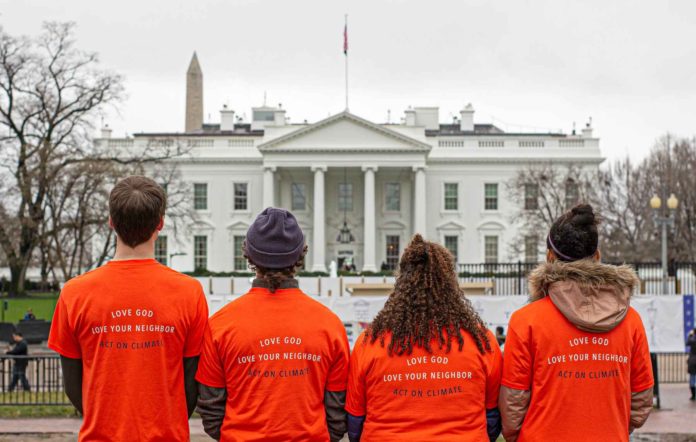On February 26, 2015 Oklahoma Senator Jim Inhofe (R-OK), chair of the Senate Environment and Public Works Committee, walked onto the floor of the U.S. Senate toting a snowball as a prop. According to Inhofe, the mere existence of the snowball was proof that climate change was a hoax.
Since Inhofe’s stunt, science denial has flowed from the mouths of Republican leadership, flooding news outlets and social media with nonsense while hundred-year storms have flooded the heartland and wildfires have charred the American West.
Whether through ridiculous, anecdotal arguments using local weather events to refute climatic trends; gross mischaracterizations of climate science and climate scientists; or lies (the planet has not warmed at all), Republican leaders turned climate change denial into a plank of the party platform. The election of Republican Donald Trump — a man who once claimed that climate change was a hoax invented by the Chinese — to the presidency in 2016 appeared to solidify that stance. With the entirety of the 2020 Republican platform unveiled as simply “Trump”, it seemed inevitable that the Grand Old Party would spiral even further into the depths of pseudo-science, soon to be debating germ theory and the law of gravity.
But the monolith of rabid, special-interest driven, climate denial among conservatives has shown cracks.
A small number of GOP politicians have recently, if begrudgingly and often with doublespeak, acknowledged the threat of climate change and the human activities behind it. This shift is partially due to influence from a growing number of vocal conservative organizations that recognize the threat of global warming and reach into traditional GOP demographics. One collection of those organizations is the Coalition for Sustainable Jobs (CSJ). A conglomerate of mostly center-right nonprofits, the coalition’s member organizations represent a diverse array of voters ranging from hunters and anglers, to investment bankers, to the largest bird enthusiast group in the world, evangelicals, and a Generation-Z led group of conservative environmental activists. Added to this eclectic mix is the Climate Emergency Fund — a philanthropic organization that funds left-wing activist groups like Extinction Rebellion and others that seek to pressure governments into aggressive action by organizing large-scale disruptions of everyday life through non-violent direct action.
CSJ was founded in 2019 by businessman, investor, entrepreneur, philanthropist, and hunter and angler Trevor Neilson, who also founded the Climate Emergency Fund in July of the same year. Neil has long been concerned with the myriad environmental issues threatening outdoor recreation opportunities and public health. Combating climate change, however, has become his driving cause. As with many other Americans facing the ravages of natural disasters exacerbated by extreme weather patterns, climate change became personal for Neilson. The shift happened in the aftermath of the Woolsey fire, in November 2018, near Neilson California home.
“It’s one thing to read the science about climate change,” Neilson says, “to notice the weather is changing and be concerned about it in an intellectual way. It’s another thing to have your wife throwing the dog and the baby into the car to flee a wall of fire along with 200,000 other people.”
To be clear, the Woolsey fire, like other wildfires across the west, wasn’t caused by climate change. Climate change was, however, responsible for the creation of conditions that led to a more expansive and fast-spreading blaze. For Neilson, the Woolsey fire drove home the realization that tomorrow’s generations will be dealing with the catastrophic consequences of the decisions we make today.
“As a father, you view your role as leaving the world better than you found it,” Neilson says. “And I think there is nothing that threatens my three kids’ future more than the climate emergency.”
Neilson says that the problem in grappling with global warming is the sheer scale of the issue. He says the climate emergency is what’s known as a “hyper object,” something so big and all consuming that people have a hard time wrapping their minds around it. “Humans are wired for short-term survival,” Neilson says. “We’re not good at seeing long-term trends. But more and more people are waking up because the problem is so severe that you can’t ignore it. It’s starting to affect people’s lives, and they see that it’s not something invented by some liberal politician.”
Neilson says that the current Republican Party’s denial of climate change is not in line with traditional conservative views. “One would think that if you are a conservative, then conserving our natural resources, conserving our wilderness, conserving our clean air and clean water for the next generation, would be one of your highest priorities,” Neilson says. What changed? According to Neilson, “the Republican Party has been manipulated by the fossil fuel industry.”
Similar to the tobacco industry’s efforts to deny the dangers of cigarettes, cigars and chewing tobacco, fossil-fuel industry-funded think tanks and lobbyists have worked to cast doubt on peer-reviewed research and the incontrovertible science of anthropogenic global warming. Unsurprisingly, many of the same people who claimed tobacco was a safe indulgence have been used to persuade politicians and the public that climate change is a hoax.
“Exxon/Mobile knew about climate change in 1981,” Neilson says, “and worked to manipulate public opinion in order to protect their profits, and they’ve done it for 40 years.” According to Neilson, once that narrative was created, many Republicans — and even some Democrats — fell prey to it.
Mitch Hescox, president and CEO of CSJ member group the Evangelical Environmental Network (EEN) says corporate influence on politics was exacerbated by a Supreme Court ruling in 2010 and turned the fossil fuel industry into a regulation-crushing juggernaut.
“Back in 2006 and 2007, acting on climate was a bipartisan action,” Hescox says. “It wasn’t until Citizens United — where a whole bunch of money came into the anti-climate faith — that a lot of Republicans left. That opened up the floodgates.”
But GOP politicians backed by fossil fuel money aren’t the only to blame. Neilson, a lifelong Democrat who once served as an aide in the Clinton Whitehouse, says, the Democrats have gotten it wrong, as well, in regards to action on climate change. “Over the years, the Democrats have slipped into making the argument that the fossil fuel industry wants them to make,” Neilson says. “We start bleeding together climate change with other social justice issues. Some people on the left would have you think that you can’t address the climate emergency without addressing poverty, or police brutality, or insert any other liberal issue. I think that’s a mistake as well because the only way we’re going to make progress with this issue is if we depoliticize it and turn it into an issue that we can all agree on.”
Earlier this year, CSJ helped in pushing through The Great American Outdoors Act. The actual environmental benefit of the GAOA is dubious since monies generated for outdoor recreation through the act are derived from the sale of extraction permits for federal lands. Still, it was an increasingly rare bipartisan win. “It was the first time the Senate has passed environmental legislation in decades,” Neilson says.
We need to rebuild our economy to get jobs, the green way, not the old-fashioned way.
Neilson believes that the core reason for the GAO Act’s support on both sides of the aisle was its economic impact. “The GAOA is a huge job creator,” Neilson says. “I think there’s a good argument that job creation is embedded in that legislation.”
The creation of jobs and the notion that private industry should be instrumental in addressing climate change were a major component of Neilson inspiration behind CSJ. “I’m a capitalist,” Neilson says. “I believe in the profit motive. I founded a whole company whose slogan is profit with purpose. Business can be a part of the solution instead of part of the problem.” But historically, business has been the biggest part of the problem. In fact, 100 companies are responsible for 71 percent of carbon emissions. Neilson says that in a perfect world, you would have corporations, government, nonprofits, faith based groups, youth, all coming together “to fight the biggest battle we’ve ever fought.”
Neilson says part of the effort to combat climate change involves the mobilization of American citizens. His ideas are modeled after those that brought the fight home during World War II when the nation’s economy was transformed, when women joined the workforce and manufacturers redesigned assembly lines to build weapons. “It was a collective American effort aimed at stopping the most perilous threat of the time,” Neilson says. “And just like then, there are certain aspects of climate change mitigation, especially in regards to infrastructure, that could have massive positive economic impacts. Investing heavily in transportation, in energy supply, modernizing the electrical grid, these are huge job creators,” Neilson says. “So that message of job creation and greening the infrastructure and taking us from a dirty energy economy to a clean energy economy is really what the coalition is all about. The twin goals [of CSJ] are job creation and decarbonization.”
Focusing political efforts on a singular objective across party lines has proven difficult throughout the history of the United States. In the current age of hyper-partisanship, cooperation often seems a pipe dream. But according to a June 2020 Pew Research study, 65 percent — about two-thirds — of Americans believe that the nation’s leadership is not doing enough to mitigate climate change. In line with this number, 79 percent of Americans say that development of alternative sources of energy — such as wind and solar — are important steps, while only 20 percent want to expand the production of fossil fuels. But when it comes to what has caused global warming, the gap between parties remains a chasm, with 72 percent of Democrats and those who lean left placing the blame on human activity compared to 22 percent of conservatives. Even that disparity may wither as the next generation reaches voting age.
“Gen Z’s defining characteristic, politically, is that we’re the climate movement generation,” says Benji Backer, president of CSJ member group the American Conservation Coalition (ACC) and a recent graduate — June 2020 — of the University of Washington.
That young liberals and progressives are motivated to vote on climate issues is a surprise to no one. But Backer’s declaration is grounded on an understanding of young conservative values. Backer has been a conservative political activist since middle school and an environmental activist since his senior year of high school. He says his focus on climate change as a conservative voice comes as a direct result of the science denial from Republican politicians.
“Realizing that as someone who cared about the environment,” Backer says, “to know that my political party didn’t engage on environmental issues really frustrated me. And when they did engage, it came from a perspective of denial or just shooting down the left instead of actually proposing their own ideas.”
Backer says membership in ACC has grown rapidly as its message resonates with Generation Z. “A lot of young people who believe in conservative values of markets and limited government want the environment to be a priority,” Backer says. “If you’re in Gen Z, this is one of your top three issues, but probably your top issue.”
Backer offered a nod to young, progressive leaders such as Gretta Thunberg and organizations like Zero Hour and Sunrise Movement, but made it clear that climate change among his age demographic is nonpartisan. “It [climate change activism] runs the gamut of the entire political spectrum,” Backer says. “This is a defining issue for our generation.”
The future of the party cannot be, you know, rolling back regulations to own the libs.
Backer claims that young people recognizing climate change as a top priority is the result of being raised in the information age, learning about both the science of climate change and the lack of action within the political realm. Perhaps most importantly, Backer says that Generation Z has witnessed environmental impacts firsthand, on social media, and has learned about them in the classroom.
“Knowing that our elected officials aren’t taking it seriously,” Backer says, “and that it’s a bunch of old, mostly white guys who are telling the country that other issues are always going to take precedence over the environment — that can’t happen anymore.”
At the center of Backer’s argument for meaningful climate change policy is an understanding that the Republican party must evolve. His vision for a conservative leadership of the future is one that embraces science. “It [climate change] has to be on the party platform,” Backer says. “It has to be on every campaign platform. It has to be something that is agreed upon by both sides. Maybe the solutions are just a little bit different, but it has to be an issue where we [conservatives] have our own solutions, and we’re not just talking about it in terms of buzzwords. I think that’s starting to happen, but it’s not fast enough. The future of the party cannot be denial of climate change. The future of the party cannot be, you know, rolling back regulations to own the libs.”
Backer argues that at some point, the bill for climate change will come due. “It’s looming in the distance,” he says. And as CO2 levels continue to climb, time is of the essence. “We need to stop these politicians from kicking the can down the road,” Backer says, “and actually do something about the environment right now.”
That CSJ is a center-right organization bolsters the coalition’s effectiveness according to Mitch Hescox. “I do a lot of work in Washington, DC,” Hescox says. “My reality and belief is that we have to have a bipartisan solution for climate. I think the only way it’s going to be bipartisan is for people like me, who were lifelong Republicans and business leaders, to talk to policy makers. People are dying, businesses are going away. We have a great change in the economy and we need to rebuild our economy to get jobs, the green way, not the old-fashioned way.”
Mitch Hescox’s thoughts mirror Backer’s — that the Republican Party will fade away if it fails to acknowledge the science. “If a conservative movement of any kind is going to last in the United States, it’s going to have to address climate change,” Hescox says. “We formed a young group called Young Evangelicals for Climate Action. They grew up with conservative backgrounds and neighborhoods. I took a bunch of them into Mitch McConnell’s office a year or so ago, and McConnell’s staff member asked if they were Republicans. A couple of them stood up and said ‘we used to be, but because of your stance on the environment and other things, we’re independents. We can’t be Democrats, but we’re not Republicans either.’”
Climate Emergency Fund board member Sarah Ezzy agrees that the key to the coalition’s influence is political amorphicity — not just a particular demographic or special interest calling for action but, instead, the collective roar of a concerned citizenry. “When people bring their voices to bear, that translates into political pressure and we need large scale change,” Sarah says. “I think everyone has a part to play where you are in your life, you have a part to protect the planet. But we also acknowledge that there are really big policy changes that are needed to shift this thing. If you have enough voices, and if they’re coming from so many different places, that’s a much stronger approach and a stronger coalition.”
Aileen Getty, heir to the Getty Oil fortune and a Climate Emergency Fund board member, says that voices matter, but that urgency is paramount and hard truth is the only card we have to play. “We can’t sugar coat it anymore,” Aileen says. “And truth has become disruptive but truth, shouldn’t be disruptive. It should be an asset. Just telling the truth [about the science of climate change] does make us uncomfortable, but there is no greater power.”
The ongoing COVID-19 pandemic has shined a harsh light on the consequences of unpreparedness that results from a refusal to deal with uncomfortable truths. Neilson believes the silver lining of the pandemic is an increased awareness of our tenuous situation.
“I think people have realized that our existing systems are actually extremely fragile,” Neilson says. “It’s very vulnerable to external shocks. The virus that emerged from Wuhan can paralyze the entire world and kill millions of people. And in that, I hope we openly have become a little more thoughtful about the fact that we need to be deliberate in the way we build our system moving forward. If this one virus can create chaos, just imagine what a cascading series of climate related events will do, including pandemics.”
Neilson believes that glimpses of an industrial world on pause have offered an opportunity to think about what kind of world we want. “In some cities you can see the mountains for the first time in a long time,” Neilson says. “You can sense that nature is trying to regenerate itself. Despite the horrible suffering from both the disease and the economic impact, I think there is a chance for the type of reset that helps people think in a new and different way about the kind of future we want to have. I’m optimistic that when people take the time to reflect upon it, most reasonable people will come to the conclusion that we need to make some changes.”
Or as Hescox states so succinctly, “It’s time that we put aside the partisan differences and even the theological differences. God gave us a brain.”
Credit: Source link































